Last year, I called Thanksgiving the holiday that consumerism couldn’t destroy. “Thanksgiving has staunchly resisted the crass commercialism that took Christmas,” I said. It’s still my favorite holiday for that reason, but it hasn’t always been the holiday we know and love.
Franksgiving
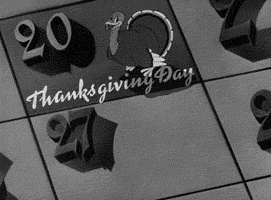
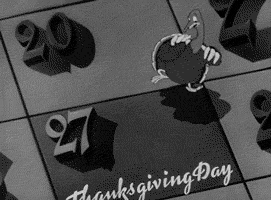 It’s particularly confusing for turkeys.
It’s particularly confusing for turkeys.Let’s start with December 1941, when President Roosevelt officially designated the fourth Thursday in November as Thanksgiving Day. This ended three years of confusion surrounding the holiday; in an effort to help businesses during the final years of the Great Depression, Roosevelt had scheduled Thanksgiving for a week earlier than usual, placing it on the third Thursday of November, rather than the fourth. He believed that doing so would help stores earn more by giving them a longer Christmas season.
His declaration was immediately met with resistance. Calendars were suddenly wrong; academic and sports schedules were ruined; families had difficulty celebrating together because some had the 23rd off while others were free on the 30th. Twenty-two states ignored his declaration completely. The mayor of Atlantic City poked fun at the change by calling the holiday “Franksgiving” (after Franklin Delano Roosevelt). The 1942 Fred Astaire film Holiday Inn mocked the events with an animated turkey who can’t figure out which date on the calendar to stand on. A political rival even compared Roosevelt to Hitler, perhaps becoming the first of very, very many to give that insult to an opponent.
Although thanks can be given anytime, Thanksgiving was clearly serious business to U.S. cititzens of the 1940s. Partially this is because of the inherent scheduling difficulties when trying to schedule something at the last minute (something my wife complains to me about regularly). But I think the larger issue is that having a scheduled and expected day set aside for giving thanks does our hearts good. As I wrote in “Remindergiving” last year, it reminds us of God’s grace, mercy and provision – which gives our hearts freedom to worship. Even secular celebrants find giving thanks to be a helpful experience for that reason.
As we prepare for a more hectic season, maybe this day should be an anchor for us, tying us to a reminder that we have so much to be thankful for.
Abrahamsgiving
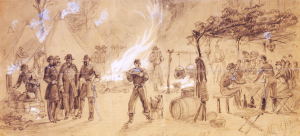 When Roosevelt set an official date, Thanksgiving as an established national holiday was actually almost 80 years old. In 1863, amid the Civil War, President Lincoln declared a national holiday to give thanks, hoping that it would spread national unity in the midst of the bloodiest disunity in the nation’s history. He was inspired by author Sarah Josepha Hale, who said “We have too few holidays” and proposed Thanksgiving as a holiday of unity “to bind us in one vast empire together” as a family.
When Roosevelt set an official date, Thanksgiving as an established national holiday was actually almost 80 years old. In 1863, amid the Civil War, President Lincoln declared a national holiday to give thanks, hoping that it would spread national unity in the midst of the bloodiest disunity in the nation’s history. He was inspired by author Sarah Josepha Hale, who said “We have too few holidays” and proposed Thanksgiving as a holiday of unity “to bind us in one vast empire together” as a family.
In his proclamation, Lincoln expressed his hope that the nation would be reunited; but he also encouraged Americans to give thanks for God’s great blessings:
No human counsel hath devised nor hath any mortal hand worked out these great things. They are the gracious gifts of the Most High God, who, while dealing with us in anger for our sins, hath nevertheless remembered mercy.
Thanksgiving, as Lincoln chartered it, was a day to enjoy family and unity, care for others, and remember what God has done for us.
Empire aside, this purpose is still what Thanksgiving means to most people: family and unity. Being reminded that we come from somewhere, and being connected to that origin. God gives us family, not only to shape and sanctify us, but also to show us an example (whether good or bad) of who He is, perfectly, within Himself: Father, Son, and Holy Spirit in joyful unity.
Humiliation Day
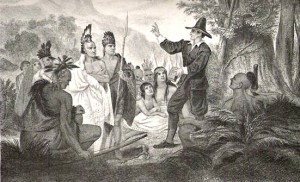 Of course, neither Lincoln nor Hale came up with the idea of giving thanks to God. George Washington was the first American president to celebrate Thanksgiving, but he wasn’t the first one to bring it to this continent either.
Of course, neither Lincoln nor Hale came up with the idea of giving thanks to God. George Washington was the first American president to celebrate Thanksgiving, but he wasn’t the first one to bring it to this continent either.
That honor belongs to the Puritans. Their days of thanksgiving were feasts of praise and rejoicing in response to God’s provision, mercy, and favor. But there was a somber companion to their thanksgiving: the day of Humiliation, a fast undertaken whenever they sensed God’s displeasure; to show their contrition, they would pray and fast to plead for God to heal a sickness or grow their crops.
These two holidays seemed to orbit one another like twin planets, each having their days but giving way to the other. God proved His provision and goodness by answering their fasting and prayers with a reason to rejoice and feast.
Puritans shunned holidays, so their days of thanksgiving and humiliation were not scheduled, but the rhythm of humiliation and thanks is interwoven throughout the Puritan lifestyle. In order to feast, you had to get through the fast.
This rhythm of fasting and feasting has been a part of God’s followers’ lives for ages, though the “fasting” part is a lot less common now. It’s important to remember this rhythm to remember how God’s grace meets us in our lack and gives us a reason to rejoice.
But while fasting and humility are important, we don’t need days of humiliation to get to Thanksgiving. Two thousand years ago, in the event that we should give thanks for the most, the Son of God came to Earth and allowed Himself to be humiliated for our sake. He died on a cross so that we could be a part of His family, and take His seat at God’s table.
Thanksgiving
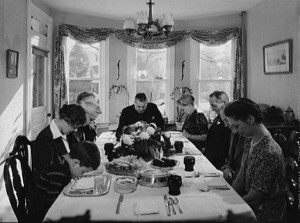 Whether you’re at the kiddie table or a table for one, worship God for the grace He showed to you. Remember God’s perfect unity and joy, and the examples of it you see in your own life. And feast to the memory of Christ on the cross, humiliated for you so that you can eat the feast God has prepared for you.
Whether you’re at the kiddie table or a table for one, worship God for the grace He showed to you. Remember God’s perfect unity and joy, and the examples of it you see in your own life. And feast to the memory of Christ on the cross, humiliated for you so that you can eat the feast God has prepared for you.
• • •
Thank you for reading Redeeming Culture. On Thanksgiving, as always, we are thankful for you, our readers. Happy Thanksgiving!
